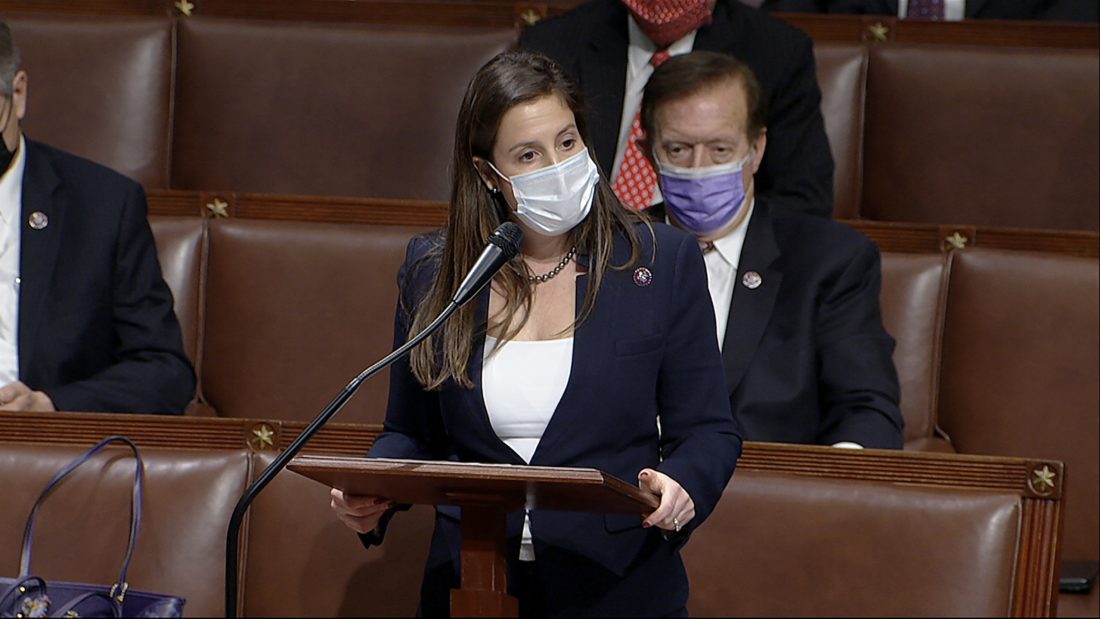Corporate donors pull support from Stefanik and others

In this image from video, Rep. Elise Stefanik, R-N.Y., speaks as the House reconvenes to debate the objection to confirm the Electoral College vote from Arizona, after protesters stormed into the U.S. Capitol on Wednesday, Jan. 6. (House Television via AP)
Large companies have started suspending political donations to members of Congress who objected to the certification of the 2020 election last week, just hours after a pro-Trump mob attacked the U.S. Capitol.
They include one of the largest benefactors of Congresswoman Elise Stefanik in the last election cycle, insurance giant Blue Cross Blue Shield.
A Blue Cross Blue Shield Association spokesperson, Taylor Laabs, wrote in an email that “we are suspending contributions to lawmakers who voted against accepting Electoral College results.”
The company’s various affiliated political action committees, which pool money donated by employees and board members, donated $15,500 to Congresswoman Stefanik’s campaign during the last election cycle and $12,500 to her Leadership PAC supporting women primary candidates, according to the campaign finance website Open Secrets. Cumulatively, these numbers made Blue Cross Blue Shield affiliates the largest contributor to Stefanik’s 2020 race.
However, Laabs said, the announced suspension “only applies to the Blue Cross Blue Shield Association,” not all PACs affiliated with its subsidiaries, and did not respond to NCPR’s inquiry as to whether the suspension also included Stefanik’s Leadership PAC.
A wave of companies reexamining their political giving Blue Cross Blue Shield was one of 144 companies contacted since last week’s riot at the Capitol by political reporter and ThinkProgress founder Judd Legum, who now publishes the newsletter Popular Information.
Among those who have since either announced publicly or told Legum they will suspend contributions to the 147 members of Congress who voted against certification are donors who, taken together, gave more than $50,000 to the Stefanik campaign through their PACs during the 2020 election cycle.
They include Comcast ($10,000), Walmart ($7,000), Verizon ($4,500), Amazon ($10,000), AT&T ($10,000), Intel ($5,000), American Express ($1,500), Best Buy ($1,000). The U.S. Chamber of Commerce ($5,000) told The New York Times that “lawmakers who did not demonstrate respect for democracy would no longer receive financial support.”
Dell ($7,500) somewhat ambiguously told Popular Information that it “will suspend all contributions to members of Congress whose statements and activities during the post-election period are not in line with Dell’s principles.”
Several more companies stopped short of halting donations to specific candidates, but indicated to Legum that they would take recent events into consideration for future campaign donations, including Stefanik donor Bank of America ($1,000). Others have said simply that they are reviewing their political contributions, including FedEx ($7,000), Exxon Mobil ($8,500), and Walmart ($7,000).
A number of companies have decided to pause all political giving for a period of several months or, in some cases, indefinitely. These include Google/Alphabet ($10,000), Citigroup ($8,000), UnitedHealth Group ($10,000) and Facebook ($1,500).
Politicians don’t normally rake in a lot of campaign cash in the months immediately following an election, said Sarah Bryner, director of research and strategy at the nonprofit Center for Responsive Politics, which runs Open Secrets. However, she said, because PACs often give early on in an election cycle, “this is hitting the people who rely most heavily on that money,” House candidates who “typically don’t have a lot of individual contributions from people coming in at the same time.”
PAC funding “is exactly the kind of money that they would be most reliant on in the first and second quarter of an off-year,” she explained, for ongoing expenses like staffing and office space.
Stefanik, she noted, “gets a lot of money from PACs, so it could hurt going into 2022.”
Alex deGrasse, a senior advisor for Stefanik’s political campaigns, wrote in an email Wednesday that “The majority of the campaign’s funding comes from small-dollar donors who have donated over $6 million dollars to her campaign. Elise for Congress has $2 million dollars in the bank and her re-election campaign has never been in a stronger position politically.”
Bryner said other PACs and wealthy individuals will likely fill in the funding gap for many members of Congress. She said it is not yet clear what impact the unheard-of wave of corporate announcements will have on politicians’ actions going forward.
“It’s probably, somewhat cynically,” Bryner predicted, “more likely that the PACs will change their course before the members do.” Corporations have an interest in staying on the right side of both parties, which is why their PACs frequently give to both Democrats and Republicans.
“But a lot of this depends on public opinion,” Bryner added, “and depends on what happens to the specific members’ fundraising and campaigning activities.”
“This is an unprecedented, really condemnation of, in some cases, all members of Congress but, in more cases it seems, of just the 147 members who objected to the electoral college count. That’s unusual in and of itself, and speaks more broadly to dissatisfaction from the business community with Congress.”



